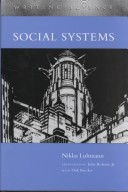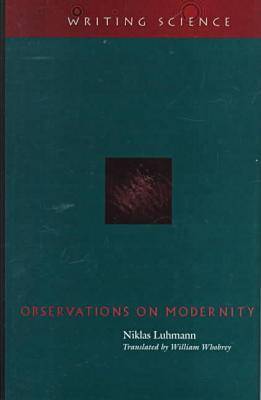Writing Science
2 total works
A major challenge confronting contemporary theory is to overcome its fixation on written narratives and the culture of print. In this presentation of a general theory of systems, Niklas Luhmann, Germany's most prominent and controversial social thinker, sets out a contribution to sociology that reworks our understanding of meaning and communication. For Luhmann, the end of metanarratives does not mean the end of theory, but a challenge to theory, an invitation to open itself to theoretical developments in a number of disciplines that, for quite some time, have been successfully working with cybernetic models that no longer require the fiction of the external observer. He links social theory to recent theoretical developments in scientific disciplines as diverse as modern physics, information theory, general systems theory, neurophysiology, phenomenology, and cognitive science. One of the most important contributions to social theory of recent decades, it has implications for many disciplines beyond sociology.
This collection of five essays by Germany's most prominent and influential social thinker both links Luhmann's social theory to the question "What is modern about modernity?" and shows the origins and context of his theory. In the introductory essay, "Modernity in Contemporary Society," Luhmann develops the thesis that the modern epistemological situation can be seen as the consequence of a radical change in social macrostructures that he calls "social differentiation," thereby designating the juxtaposition of and interaction between a growing number of social subsystems without any hierarchical structure. "European Rationality" defines rationality as the capacity to see the difference between systems and their environment as a unity. Luhmann argues that, in a world characterized by contingency, rationality tends to become coextensive with imagination, a view that challenges their classical binary opposition and opens up the possibility of seeing modern rationality as a paradox.
In the third essay, "Contingency as Modern Society's Defining Attribute," Luhmann develops a further and probably even more important paradox: that the generalization of contingency or cognitive uncertainty is precisely what provides stability within modern societies. In the process, he argues that medieval and early modern theology can be seen as a "preadaptive advance" through which Western thinking prepared itself for the modern epistemological situation. In "Describing the Future," Luhmann claims that neither the traditional hope of learning from history nor the complementary hope of cognitively anticipating the future can be maintained, and that the classical concept of the future should be replaced by the notion of risk, defined as juxtaposing the expectation of realizing certain projects and the awareness that such projects might fail. The book concludes with "The Ecology of Ignorance," in which Luhmann outlines prospective research areas "for sponsors who have yet to be identified."
In the third essay, "Contingency as Modern Society's Defining Attribute," Luhmann develops a further and probably even more important paradox: that the generalization of contingency or cognitive uncertainty is precisely what provides stability within modern societies. In the process, he argues that medieval and early modern theology can be seen as a "preadaptive advance" through which Western thinking prepared itself for the modern epistemological situation. In "Describing the Future," Luhmann claims that neither the traditional hope of learning from history nor the complementary hope of cognitively anticipating the future can be maintained, and that the classical concept of the future should be replaced by the notion of risk, defined as juxtaposing the expectation of realizing certain projects and the awareness that such projects might fail. The book concludes with "The Ecology of Ignorance," in which Luhmann outlines prospective research areas "for sponsors who have yet to be identified."

